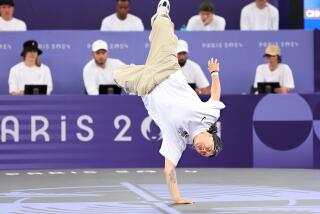And You Thought They Did Enough Damage . . .
- Share via
NAGANO, Japan — Ugly Americans, half-hearted Olympians, deadbeat tenants, bad haircuts, truly rotten karaoke singers--yes, the U.S. men’s hockey team did it all in Nagano.
Bust of these Winter Games?
Do you really need to ask?
(Is there even a runner-up this side of the Japan Alps?)
But just to make sure, the In-Your-Dreams-Teamers poured it on early Thursday morning, piling up the final tally, padding their statistics by busting up a pair of apartments in the athletes’ village.
Final U.S. men’s hockey totals from Nagano:
Games Won: 1.
Games Lost: 3.
Goals Scored: 9.
Goals Allowed: 14.
Living Quarters Trashed: 2.
Fire Extinguishers Extinguished Inside Living Quarters: Several.
Fire Extinguishers Pitched Over Fifth-Floor Balcony: 1.
Estimated Damage in U.S. Dollars: $1,000.
I thought Keith Tkachuk was one of the inspirational leaders on this team, not Keith Moon.
They truly were Team Spinal Tap, these hapless American pucksters who came, saw and botched every move they made, destroying everything they touched.
Did they do anything right before pulling out of town?
Oh, right: They pulled out of town early.
On paper, the Dream Team format for Olympic hockey seemed a great idea, a stroke of clear-headed thinking by the normally self-serving NHL owners. For once, seeing the big picture was made the priority and the NHL season was put on ice for 17 days to give the sport a shot in the arm in the United States.
Instead, all American hockey got was a cold shot out of a fire extinguisher.
The United States plays host to the next Winter Olympics, putting any future Dream Team hockey tournament in severe jeopardy.
If you were Salt Lake City, would you let any American professional hockey player within 50 miles of the city limits?
(Then again, American professional hockey players could take the problem out of Salt Lake City’s hands and just say no on their own. When it comes to 4:30-in-the-morning karaoke-and-Kirin carousing, Salt Lake City is the anti-Nagano.)
As one disgusted U.S. journalist said on the morning media bus, “We should just send Harvard next time. They behave--and they could beat Belarus too.”
The worst thing about Thursday’s room-trashing was that it happened at 4 a.m., awakening U.S. speedskaters trying to sleep nearby.
Is it mere coincidence that hours later, Chris Witty, women’s world champion and world-record holder at 1,000 meters, went out and settled for silver in her best event?
Of all the American medals handed out so far--11 in all, well below USOC projections--Witty’s silver qualifies as the first disappointment. Her bronze medal at 1,500 meters was a pleasant surprise, but 1,000-meter gold was hers to lose, and she did--to her friend and sometimes roommate, Marianne Timmer of the Netherlands.
To win, all Witty needed to do was skate within a second of her personal best--and wasn’t everybody cranking out personal bests on clapskates on the M-Wave ice?
Instead, Witty came in at 1:16.79--nearly 1.4 seconds slower than her world-record time. Timmer lowered her personal best by 2 1/2 seconds and upset Witty in an Olympic-record 1:16.51.
Still, Witty figures to leave Nagano with two medals, which is three medals fewer than Russian cross-country skier Larissa Lazutina, but one more than any other American here.
Lazutina’s fifth medal of these Games was a bronze in the women’s 30-kilometer event, two notches below Russian teammate Yulia Tchepalova’s gold. Now with medals of every available color--three gold, one silver, one bronze--Lazutina used the podium as a soap box for her feud with the Russian cross-country ski federation.
“It will shake up the Russian federation, certain conclusions will be drawn from our results,” said Lazutina, who along with Tchepalova, trains on her own, outside surveillance of the grumpy old men who control Russian cross-country skiing. “Previous mistakes will be taken into account.”
Deborah Compagnoni of Italy won her ski-off with Katja Seizinger and became the first Alpine skier to win gold medals in three Games by conquering the women’s giant slalom course. With gold medals in 1992, 1994 and now 1998, Compagnoni joins Seizinger and Vreni Schneider as the only women to have won three Alpine gold medals.
Meanwhile, the rest of the world sits and waits and wants to know how many flight attendants’ serving carts got overturned during Team Spinal Tap’s flight back home.
More to Read
Go beyond the scoreboard
Get the latest on L.A.'s teams in the daily Sports Report newsletter.
You may occasionally receive promotional content from the Los Angeles Times.







